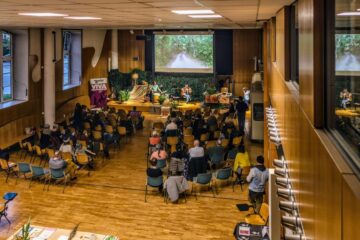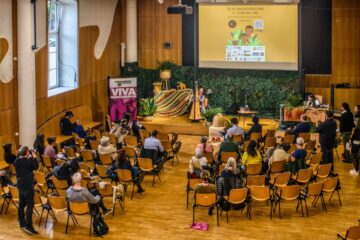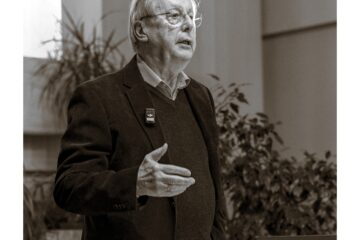Migration wird oft in « Zahlen » erklärt oder als einzelne « Fallgeschichte ». Rizalind Tumanda kann eine dritte Geschichte erzählen. Die Sozialarbeiterin arbeitet auf den Philippinen mit ArbeitsmigrantInnen. Nun hat Rizalind Tumanda Österreich besucht, um darüber zu sprechen, was die Gründe dafür sind, dass Mütter, Väter und selbst Kinder ihre Heimat verlassen, als globale ArbeitsmigrantInnen.
Migration as phenomenon is often explained by statistical numbers of single case stories. Rizalind Tumanda is able to tell a « third story » on migration. As a social worker she supports labour migrants on the philippines. During her visit in Austria Rizalind Tumanda was able to speak about the various reasons that cause mothers, fathers or even children to leave their homes to find work overseas.
8,5 Millionen Menschen in Bewegung, weil politische und ökonomische Krisen und Naturkatastrophen wie Taifune die Aussicht auf ein gutes Leben in der Heimat zerstörten. Die Hälfte der Migranten ist weiblich und vor allem jung. Sie geben soziale Beziehungen und Netzwerke auf und lassen sich ein auf die Unsicherheiten globaler Arbeitsmärkte, die zwar mit Einkommen locken, aber oftmals Informalität und alle Formen von Gewalt bedeuten.
8.5 Billion people are on the move, because of politcal and economic uncertainties or natural deseaster like taifuns. Almost half of them is female and youger than thirty years. These migrants will abandon their social networks and family ties and seek for their fortune on global labour markets, quite often confronted with informal employments and all formes of violence.
Rizalind Tumanda ist Sozialarbeiterin bei den Mindanao Migrants in Davao City
Die Sendung ist entstanden mit freundlicher Zusammenarbeit von:
Interview von Greta Kostka mit Rizalind Tumanda.
Übersetzungen von Johanna Goldmann und Petra Ertl.
Aufnahmen und Organisation Helga Hager, Katholische Frauenbewegung.
Moderation und Schnitt: Walther Moser.
cocoyoc



















